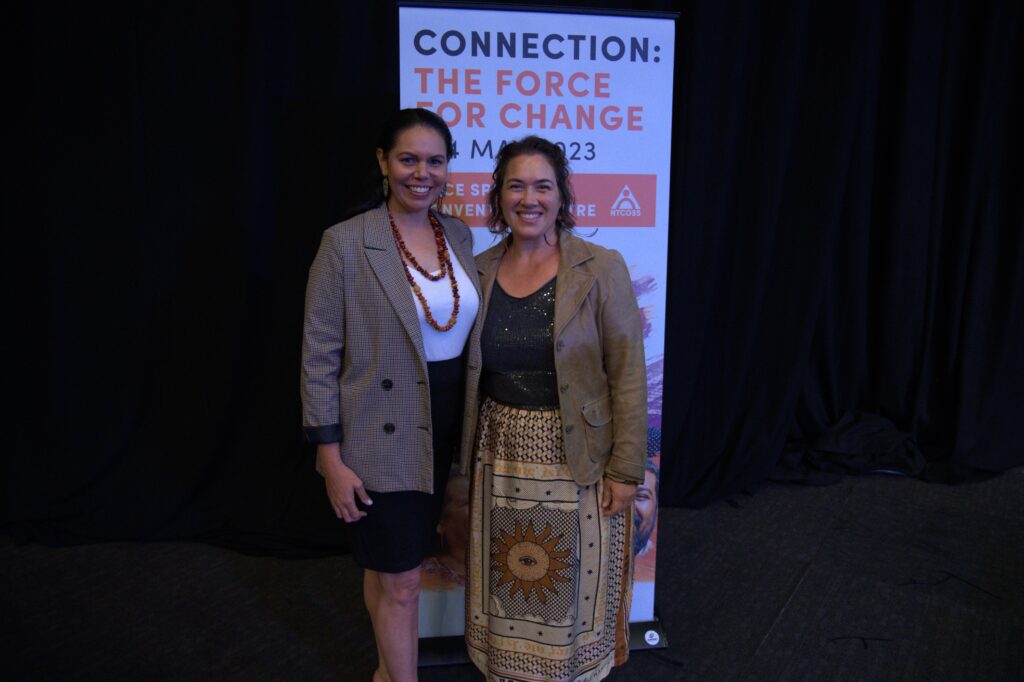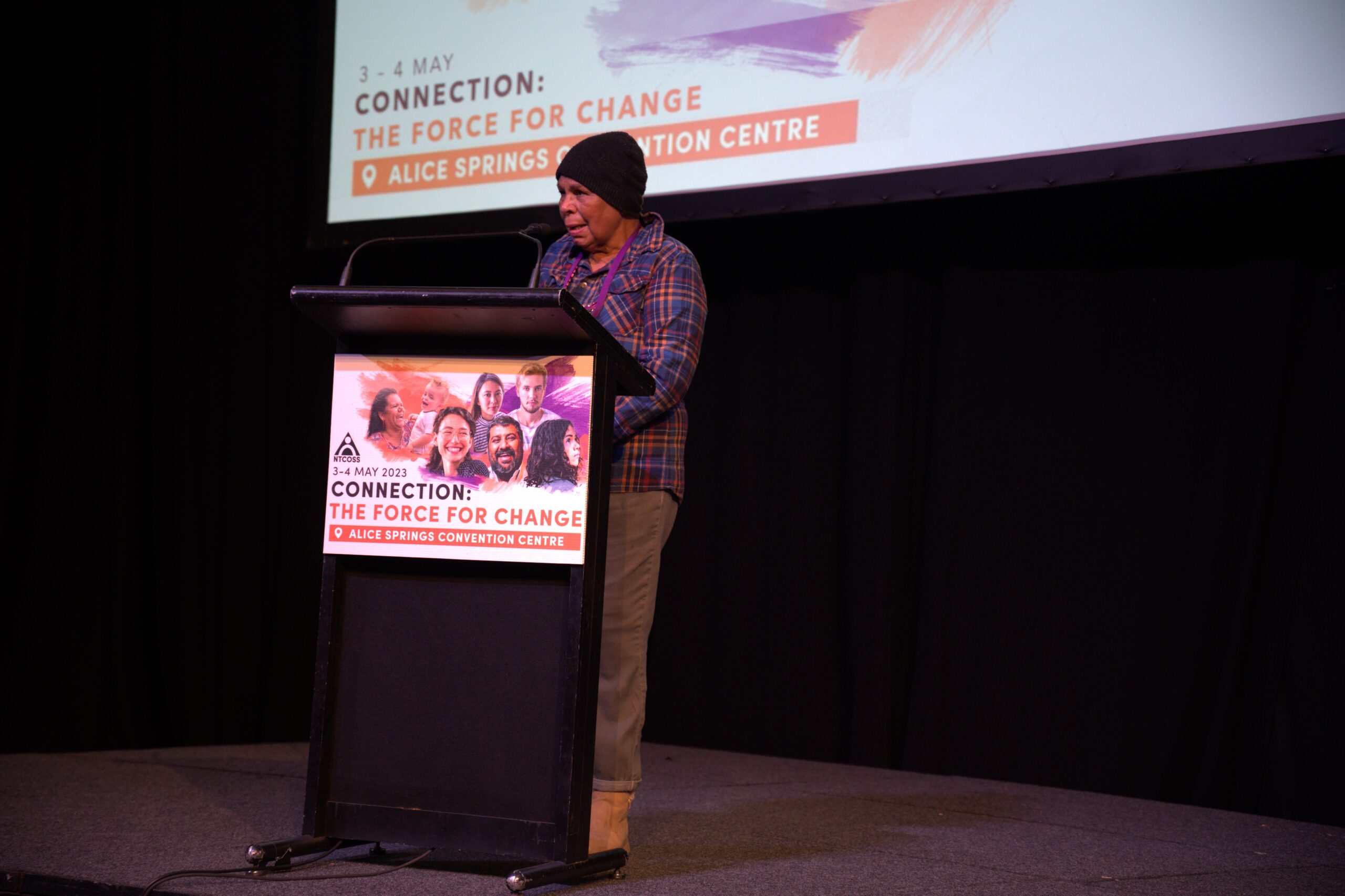
We were delighted to host a two-day conference in May 2023 in Mparntwe/Alice Springs, focused on the theme of Connection: The Force of Change.
There were powerful and emotional ideas and stories spoken about to drive social change and challenge the power structures that create disadvantage and inequality.
Those structures prevent us from supporting resilient and thriving communities.
It had been a long wait. Our last conference was in 2019, with COVID-19 pandemic stopping it in 2021.
There have been wins for progressive reform in that time in the Northern Territory.
In 2022, there was the raising the age of criminal responsibility from 10 to 12, the passing of the Anti-Discrimination Act reform bill and signing of the Aboriginal Justice Agreement.
Unfortunately, significant progress is still needed at the NT and federal level.
NTCOSS policy manager Sarah Holder highlighted to conference attendees the cost of living, inflation, climate change, growing inequality, an affordable housing shortage and the funding pressures for our sector,
Keynote speaker Catherine Liddle, the Chief Executive Officer at SNAICC-National Voice for our Children spoke about her organisation’s work as the national non-governmental peak body for Aboriginal and Torres Strait Islander children.
SNAICC works for the fulfilment of the rights of Aboriginal and Torres Strait Islander children, to ensure their safety, development and wellbeing.
This is a timely issue in Alice Springs, where the conference was held and where Aboriginal children were being “weaponised and demonised” for political and racist reasons, she said.
SNAICC worked to ensure Aboriginal children should be “proud, loud and noisy” about how their culture had a resilient legacy of 60,000 years of successfully raising children behind it.
Aboriginal communities were grounded in the care and nurture of their families, a place we had to get back to.
“Before colonisation we had no child protection systems and no prisons. What we had was a sophisticated society that centred our children in all that we did.
“We must have an honest discussion about racism and how the politics of racism is driving a lot of this debate.
“Something has gone fundamentally wrong, it’s not Aboriginal and Torres Strait Islanders facing this, it is in our ability to care in communities across Australia. Where is the safe access to play for children and to sleep at night?
Australian Council of Social Service CEO Dr Cassandra Goldie said as one of the – if not the – wealthiest countries in the world Australia should have an adequate social security system.
Most people instinctively want to “wrap our arms around others who are more vulnerable”.
But we get confused by misinformation such as being told “we are a high taxing country” when more tax revenue would deliver the “good things in life” such as health, justice and education.
We provide the lowest level of income support for the unemployed of the 37 OECD wealthiest countries in the world.
We are ninth lowest for revenue we collect through taxes, which would fall further by about $20 billion with the stage three tax cuts coming, on top of what former Treasury secretary Dr Ken Henry said was a $50 billion budget shortfall, she said.
“Social security is a critical determinant of health and justice outcomes and essential to deliver people’s basic economic security.
“As the pandemic showed us, as disasters show us, unemployment is just around the corner and can happen to most people and at any time does affect 1.1 million people,” she said.
Dr Tessa Boyd Caine, the CEO of Health Justice Australia, spoke about how seeing a lawyer can be good for your health and even save lives.
Her work forms partnerships that recognise that people with legal/justice problems are also experiencing underlying intersecting health and social problems.
One example would be a lawyer advising a new mum about the risk factors for a child protection notification and encouraging her into the antenatal program at the hospital or her partner into the drug, alcohol and mental health service.
“Imagine what happens if we turn the child protection system from one that identifies risk and removes children from their families to one that tackles the health, legal and social problems that give rise to that risk in the first place.
ANU Emeritus Professor Jon Altman provided a sobering reality check about the state of Aboriginal and Torres Strait Islander people in Australia.
The Closing the Gap targets first produced in 2008 are going badly nationally.
The NT comes out looking worse compared to other places with deep poverty and things are going backwards in employment, education and training, related to a lack of policy logic, duplication of resources, and money wasted and not spent where it’s needed most.
Remoteness equalled an absence of mainstream opportunities, more than 50% of Aboriginal people in the NT live under the poverty line.
“This causes high morbidity, premature death and youth anomie and outbursts of deep discontent and social disruption,” Prof Altman said.
But he also provided hope. The Aboriginal-owned Arnhem Land Fire Abatement Ltd helps reduce Australia’s carbon emissions. Three mega projects – including the Sun Cable solar project in the NT – are situated on Aboriginal land and will provide jobs.
Despite the difficult job our members and sector have, to see politically active young people participating in panels such as Jordon Humphries and Apajok Biar was inspiring and gave hope the next generation can build a better future.
We also have a progressive, Aboriginal Attorney General in Chansey Paech, who has supported our sector’s work by raising the age of criminal responsibility to 10 to 12, who says “jailing is failing” and is committed to developing the Aboriginal community controlled sector to deliver therapeutic programs. The NT government will fund expansions of alternative to custody programs in budget.
The conference featured a range of panel discussions, covering worker wellbeing, the importance of storytelling to drive change and the need for strong allies and partnerships.
Thanks to our valued members, sponsors including the Northern Territory Government Department of Territory Families, Housing and Communities, NT Primary Health Network Rural Workforce Agency, Hesta, Bendigo Bank and Yeperenye Shopping Centre and the diverse group of attendees from across the NT and the nation, including community leaders, policymakers and advocates for social change.
The conference was a great success, bringing together a diverse range of stakeholders who want to build a more just, equitable, and supported society for all.
